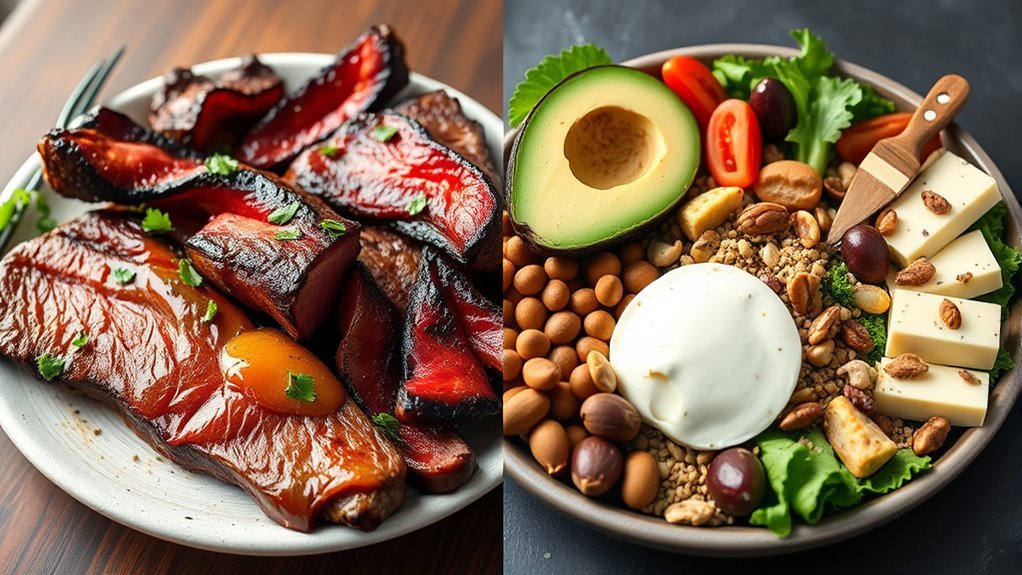The Carnivore diet focuses solely on animal products, completely eliminating plant-based foods, while the Keto diet emphasizes high fats, moderate protein, and low carbohydrates, allowing for some low-carb vegetables and fruits. The Carnivore diet typically has a macronutrient composition of 70-80% fat and 0% carbohydrates, whereas Keto contains around 70-75% fats and 5-10% carbohydrates. Both diets aim for weight loss, but they come with unique nutritional risks and benefits that you might want to explore further.
Overview of the Carnivore Diet

The carnivore diet, often seen as the ultimate form of low-carb eating, emphasizes the exclusive consumption of animal products. Centered around carnivore principles, this approach promotes meat-based nutrition, claiming benefits like weight loss, improved mental clarity, and reduced inflammation. By eliminating carbs entirely, you might find that your body shifts into a state of ketosis, using fat for fuel instead of glucose. Advocates argue that this diet aligns with human evolutionary history, suggesting that our ancestors thrived on animal foods. However, it’s vital to reflect on the potential downsides, such as nutrient deficiencies and digestive issues. Balancing your diet is essential, even within the carnivore framework, to guarantee you’re meeting your nutritional needs while enjoying the freedom of your food choices.
Overview of the Keto Diet

The keto diet focuses on high-fat, low-carb macronutrient ratios, which can lead to a state of ketosis where your body burns fat for fuel. You’ll find a variety of food choices allowed, including healthy fats, meats, and low-carb vegetables, while grains and sugars are typically off-limits. Many people turn to keto for its potential health benefits, such as weight loss and improved blood sugar control, but it’s essential to contemplate how it fits your individual needs. Additionally, the metabolic state of ketosis allows for efficient fat burning, providing sustained energy for daily activities.
Macronutrient Ratios Explained
While many diets emphasize caloric intake, the keto diet focuses on macronutrient ratios, aiming for a significant shift in metabolism. In a typical keto plan, you’ll find a macronutrient balance of about 70-75% fats, 20-25% protein, and only 5-10% carbohydrates. This unique distribution encourages your body to enter ketosis, where it burns fat for energy instead of glucose. By understanding these ratios, you’re better equipped to align your dietary preferences with keto principles. It’s not just about what you eat, but how much of it contributes to your overall goals. Embracing this framework can empower you to make choices that suit your lifestyle while promoting metabolic health and sustained energy levels. Additionally, incorporating healthy fats into your diet is essential for maintaining these macronutrient ratios effectively.
Food Choices Allowed
Understanding what foods are allowed on the keto diet can make your journey toward ketosis smoother and more enjoyable. The keto diet emphasizes low-carb, high-fat foods, which means you’re encouraged to enjoy a variety of options. Focus on nutrient-dense foods like avocados, nuts, seeds, and leafy greens, which provide essential vitamins while keeping carbs low. Quality proteins, such as fatty fish and grass-fed meats, are also key players in this plan. While you have the freedom to choose from a wide range of foods, it’s vital to prioritize those that deliver high nutritional value. This balance not only supports your health but also guarantees your meals remain diverse and satisfying throughout your keto experience. Incorporating healthy fats is essential for energy and cell function on the keto diet.
Health Benefits Overview
When you adopt a keto diet, you may discover a range of health benefits that extend beyond weight loss. This low-carb, high-fat approach can lead to improved metabolic efficiency, helping your body burn fat for fuel. Many people report enhanced energy levels and mental clarity, attributed to stable blood sugar levels. Additionally, the diet may assist in reducing inflammation and supporting heart health by lowering triglycerides and increasing HDL cholesterol. A focus on high-quality fats can also enhance nutrient absorption, ensuring your body gets essential vitamins and minerals. Overall, a keto diet not only supports weight management but also promotes holistic well-being, allowing you to feel empowered in your health journey. Furthermore, incorporating healthy fats into your meals can maximize the benefits of this dietary approach.
Key Differences in Food Choices

When comparing the carnivore and keto diets, the differences in allowed foods are significant. While the carnivore diet focuses exclusively on animal products, the keto diet includes a broader range of options, including low-carb vegetables and some dairy. Understanding these distinctions, along with their unique macronutrient ratios, can help you make an informed choice that aligns with your health goals.
Allowed Foods Comparison
While both the carnivore and keto diets focus on low carbohydrate intake, their allowed food choices differ considerably. The carnivore diet restricts you to animal-based foods, primarily meat, fish, and animal products, limiting food variety greatly. In contrast, the keto diet allows for a broader range of foods, including low-carb vegetables, nuts, and dairy, enabling greater culinary creativity. This flexibility in food sources can enhance meal planning while maintaining a focus on nutritional balance. With the keto approach, you can cater to various dietary preferences, whereas the carnivore diet’s strict dietary restrictions may appeal to those seeking simplicity. Additionally, the keto diet emphasizes healthy fats that support overall health while keeping carbohydrate intake within limits. Ultimately, your choice will depend on how much variety and flexibility you desire in your eating habits.
Plant-Based Options
Although the carnivore and keto diets primarily emphasize animal products and low carbohydrate intake, the inclusion of plant-based options varies considerably between the two. The keto diet allows for some plant-based proteins, which can serve as vegan alternatives, while the carnivore diet strictly excludes all plant foods.
Here’s a quick comparison:
| Diet Type | Plant-Based Options |
|---|---|
| Carnivore | None |
| Keto | Low-carb veggies, nuts, and seeds |
| Plant-based proteins (tofu, tempeh) | |
| Vegan alternatives (nut butters) |
For those on a keto diet, incorporating a small amount of plant-based proteins can enhance meal variety, while carnivore dieters focus solely on animal sources for their nutritional needs. It’s important to note that monitoring body reactions is essential for those adapting to a ketogenic lifestyle.
Macronutrient Ratios
Understanding the macronutrient ratios in the carnivore and keto diets can provide insights into how food choices impact overall health and weight management. The carnivore diet focuses on animal products, leading to a high-protein, high-fat intake, with virtually no carbs. In contrast, the keto diet emphasizes a specific macronutrient balance: low carbs, moderate protein, and high fats, allowing for dietary flexibility within those parameters.
- Carnivore: 70-80% fat, 20-30% protein, 0% carbs
- Keto: 70-75% fat, 20-25% protein, 5-10% carbs
- Carnivore limits plant foods entirely
- Keto includes low-carb vegetables
- Both aim for ketosis but differ in food sources
The macronutrient breakdown of each diet is crucial for understanding how they support different health goals. Understanding these differences helps you make informed choices that align with your goals of health and freedom.
Macronutrient Composition
When comparing the macronutrient composition of the carnivore diet and the ketogenic diet, it’s essential to recognize their foundational differences. The carnivore diet focuses primarily on animal-based protein sources, emphasizing a high-protein and high-fat intake, often resulting in a macronutrient balance that’s chiefly zero carbohydrates. In contrast, the ketogenic diet maintains a specific ratio, typically around 70% fat, 25% protein, and 5% carbohydrates, allowing for a variety of low-carb, high-fat foods, including plant-based options. This flexibility offers more freedom in food choices, while still promoting ketosis. Additionally, the ketogenic diet encourages the consumption of whole, nutrient-dense foods, which can enhance overall health and wellbeing. By understanding these distinctions, you can better assess which dietary approach aligns with your personal health goals and lifestyle preferences.
Potential Health Benefits of the Carnivore Diet
As you explore the potential health benefits of the carnivore diet, you might find that its simplicity can lead to significant improvements in certain health markers. This meat-centric approach emphasizes nutrient density, which can support various aspects of your health. Here are some potential benefits:
- Enhanced digestive health through a reduction in fiber-related issues
- Inflammation reduction, which may alleviate chronic pain
- Improved muscle preservation, essential for maintaining strength
- Increased energy levels and metabolic flexibility
- Better mental health, potentially reducing anxiety and depression
With nutrient-rich animal products, you’ll likely experience improved vitamin absorption and immune support while managing cravings effectively. This focused diet offers a unique opportunity to explore how your body responds to a minimalistic approach to nutrition.
Potential Health Benefits of the Keto Diet
The keto diet has gained attention for its potential health benefits, particularly in weight loss, improved mental clarity, and blood sugar control. Research suggests that by greatly reducing carbohydrates, your body shifts to burning fat for fuel, which can lead to effective weight management. Additionally, some studies indicate that ketosis may enhance cognitive function and stabilize glucose levels, making it a compelling option for many individuals. Moreover, the shift to ketones as energy may provide neuroprotective effects that support both physical health and mental well-being.
Weight Loss Effects
Although many diets claim to promote weight loss, the ketogenic diet has garnered significant attention for its potential health benefits, particularly in fat reduction. By shifting your body into a state of ketosis, you may experience several weight loss effects:
- Increased fat burning due to low carb intake
- Greater appetite control
- Enhanced metabolic adaptation, making it easier to maintain a caloric deficit
- Stabilized blood sugar levels, reducing cravings
- Improved energy levels, allowing for more physical activity
These elements can contribute to effective weight loss, but it’s essential to remember that individual results vary. Always consider your unique health needs and consult a healthcare professional before making significant dietary changes. Embracing a balanced approach can empower your journey toward better health. Additionally, understanding daily carb limits can help you optimize your dietary choices for better results.
Improved Mental Clarity
When you adopt a ketogenic diet, you might notice an improvement in mental clarity. Research suggests that switching to a low-carb diet can boost cognitive function by enhancing your brain’s fuel efficiency. Instead of relying on glucose, your brain taps into ketones, which are produced during fat metabolism. This shift may lead to better mental performance, allowing you to think more clearly and focus more effectively.
Additionally, some studies indicate that a ketogenic diet could reduce brain fog and enhance mood stability, which further contributes to improved cognitive abilities. While individual experiences may vary, many people report a heightened sense of alertness and mental acuity after embracing this lifestyle. So, if you’re seeking mental freedom, keto could be a beneficial path to explore.
Blood Sugar Control
As you explore the potential health benefits of a ketogenic diet, blood sugar control stands out as a significant advantage. By reducing carbs, many people experience more stable blood sugar levels, which can lead to improved overall health. Here are some key points to take into account:
- Helps minimize blood sugar fluctuations
- Enhances insulin sensitivity
- May reduce the risk of type 2 diabetes
- Supports weight management through reduced cravings
- Often leads to lower food intake
These factors contribute to a more balanced energy level and improved mood. Remember, everyone’s body responds differently, so it’s essential to monitor your individual results. Embracing keto might empower you to take charge of your health and experience the freedom that comes with stable blood sugar.
Possible Risks and Considerations
While both the carnivore and keto diets can offer unique health benefits, it’s vital to evaluate their potential risks and individual suitability. You might face nutritional deficiencies, especially on the carnivore diet, which eliminates entire food groups rich in vitamins and minerals. Digestive issues can arise due to a lack of fiber, common in both diets. Ethical concerns also emerge, particularly with the carnivore approach, as it raises questions about animal welfare and environmental impacts. In addition, the long-term effects of adhering strictly to either diet are still under investigation, and you should consider how these diets align with your personal values and health goals. Ultimately, it’s essential to listen to your body and consult a healthcare professional before making significant dietary changes.
Long-term Sustainability
Considering the long-term sustainability of the carnivore and keto diets is essential for anyone contemplating these eating patterns. Both diets present unique sustainability challenges that can impact long-term adherence.
- Nutrient diversity: Carnivore may lack essential vitamins and minerals.
- Food variety: Keto offers more options, potentially easing boredom.
- Social situations: Both diets can be restrictive in social settings.
- Personal preferences: Your enjoyment of food matters for sticking with a diet.
- Health monitoring: Regular check-ups are vital to assess health impacts.
Ultimately, the effectiveness of either diet hinges on your individual preferences and lifestyle. It’s important to evaluate how each diet fits into your life, ensuring it promotes not just weight loss but overall well-being in the long run.
Which Diet Is Right for You?
Deciding which diet is right for you involves evaluating your personal health goals, lifestyle preferences, and how each diet aligns with your daily routine. Consider your diet preferences and nutritional needs. If you prioritize high protein and fat, the carnivore diet may suit you. Conversely, if you prefer a variety of foods while keeping carbs low, keto might be the better choice. Think about lifestyle factors like food availability and meal planning; keto allows for more flexibility with ingredients. Additionally, take into account any health conditions you may have, as they may influence your decision. Ultimately, your taste preferences and how each diet fits into your life will guide you toward the right choice for your journey.
Tips for Transitioning Between Diets
Changing between diets can be challenging, especially when shifting from a carnivore diet to keto or vice versa. To ease the change, consider these tips:
- Meal planning: Prepare meals ahead to avoid impulsive choices.
- Nutrient tracking: Monitor your intake to guarantee you’re meeting dietary needs.
- Hydration levels: Stay hydrated, as both diets can affect water balance.
- Portion control: Adjust portions to align with your new dietary focus, helping with cravings control.
- Mindset shifts: Embrace the change positively; it’s about finding what works for you.
Utilizing different cooking techniques and exploring snack alternatives can also help during social situations, ensuring you maintain energy management and stay committed to your new dietary path.
Frequently Asked Questions
Can I Combine Elements of Both Diets for Better Results?
Absolutely, you can combine elements of both diets for better results! By integrating high-fat animal products from the carnivore diet with low-carb options from keto, you can create a versatile meal planning strategy. This diet combination allows for flexibility while maintaining a focus on healthy fats and protein. Just guarantee you’re monitoring your nutrient intake to stay balanced and avoid potential deficiencies, promoting overall health and wellness. Enjoy the freedom to tailor your meals!
How Do These Diets Impact Exercise Performance?
Both diets can greatly impact your exercise performance. Carnivore may enhance recovery due to its high protein content, helping muscles repair faster. Keto, on the other hand, can improve endurance by stabilizing energy levels through fat oxidation. However, some people might experience a dip in performance during the initial adaptation phase. It’s crucial to listen to your body and adjust your approach to find what fuels your freedom in fitness best.
Are There Specific Foods to Avoid on Both Diets?
On both diets, you’ll want to avoid high-carb foods, like grains, sugars, and starchy vegetables. The carnivore diet restricts all plant-based foods, focusing solely on animal products. In contrast, the keto diet allows non-starchy vegetables while emphasizing low-carb options. Understanding these food restrictions can help you navigate diet comparisons effectively. By focusing on what’s beneficial for your goals, you can enjoy the freedom to choose what best suits your lifestyle.
What Are Common Misconceptions About These Diets?
You might think both diets are overly restrictive, but that’s a common misconception. Many people misunderstand the benefits, believing these diets lack essential nutrients. In reality, both can offer a variety of health benefits when followed correctly. You don’t need to miss out on nutrients if you’re mindful of your choices. Understanding the dietary restrictions helps you make informed decisions, allowing you to enjoy freedom while still prioritizing your health.
How Do These Diets Affect Mental Clarity and Focus?
You might be surprised to learn that both diets can enhance mental clarity and focus. Studies suggest that the high-fat content in both carnivore and keto can provide significant mental benefits, often improving cognitive function. While carnivore focuses solely on animal products, keto allows for some carbs, potentially offering a more balanced approach. You’ll likely find that your energy levels stabilize, leading to sharper thinking and a greater sense of freedom in your daily life.
References
- https://www.healthline.com/nutrition/carnivore-diet-vs-keto-diet
- https://www.ncbi.nlm.nih.gov/pmc/articles/PMC7468148/
- https://www.webmd.com/diet/carnivore-diet
- https://www.verywellfit.com/carnivore-diet-vs-keto-diet-5183436
- https://www.medicalnewstoday.com/articles/carnivore-diet-vs-keto-diet
- https://www.wellandgood.com/carnivore-diet-vs-keto/
- https://www.clevelandclinic.org/health/articles/what-is-the-carnivore-diet
- https://www.nutrition.org.uk/healthyliving/healthyeating/fad-diets/carnivore-diet.html


